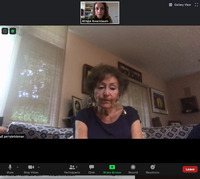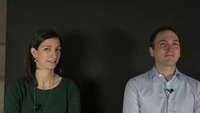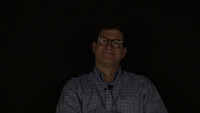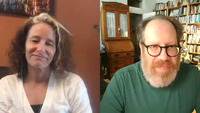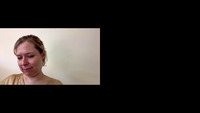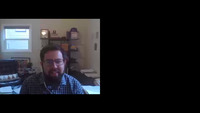Rabbi Max Miller and Rabbi Rachael Klein Miller were interviewed by Sandra Berman on December 3, 2021. Biographical Sketch: Max Miller Max Reuben Miller was born in Richmond, Virginia in 1989 and moved to suburban Atlanta just after the 1996 Olympics. He attended Jewish day school from fifth through twelfth grade at the Davis Academy and The Weber School and has lived in Johns Creek for most of his life. Max was heavily influenced to become a rabbi by his childhood rabbi Julie Schwartz and the headmaster of The Weber School, Sim Pearl. Rabbi Max graduated from the University of Maryland, College Park with a bachelors degree in arts and Humanities. At the University of Maryland, Rabbi max majored in Jewish Studies and focused on Israeli history, modern Hebrew, and the modern Jewish experience. He also joined the Jewish fraternity Alpha Epsilon Pi while at the University of Maryland. Rabbi Max continued his education at the Hebrew Union College-Jewish Institute of Religion at both the Jerusalem and Cincinnati campuses. He graduated with a masters in Hebrew Letters in 2016 and was ordained by HUC in May of 2017. Rabbi Max also received a masters concentration in Israel Education from The iCenter: For Israel Education in Chicago, Illinois. He served as the student rabbi to congregations in Kokomo, Indiana, Ft. Walton Beach, Florida, Sylvania, Ohio, and Isaac M. Wise Temple in Cincinnati, Ohio. Rabbi Max met his wife and fellow Temple Emanu-El Rabbi Rachael Klein Miller at HUC in Jerusalem. When it came time to move back to the states, the couple decided to attend HUC in Cincinnati together. After being ordained as rabbis, Rachael and Max moved to Atlanta where they became rabbis at Temple Emanu-El in 2017. The pair are now Associate Rabbis at Emanu-El and have a daughter named Zohara together. Biographical Sketch Rachael Klein Miller Rachael Aryn Klein was born in Kansas City, Missouri in 1990 and raised in Leawood, Kansas, a suburb of Kansas City. Rachael grew up attending The Temple, Congregation Bnai Jehudah. She first attended Drake University in Des Moines, Iowa on a soccer scholarship, but transferred to University of Missouri Kansas City, where she decided she wanted to major in Jewish Studies and work in the Jewish world. This decision led her to attend the American Jewish University in Los Angeles, California, where she graduated with a bachelors degree in Jewish Studies. Rabbi Rachael continued her education at the Hebrew Union College-Jewish Institute of Religion in Jerusalem, Israel and Cincinnati, Ohio, where she received a masters of Hebrew Letters and was ordained in 2017. She also received a masters concentration in Israel Education from The iCenter for Israel Education in Chicago, Illinois. During her years at HUC, Rabbi Rachael worked in congregations as a student rabbi in Rapid City, South Dakota, Sandusky, Ohio, Seminole, Oklahoma, and the I. M. Wise Temple in Cincinnati. Rabbi Rachael met her husband and fellow Temple Emanu-El Rabbi Max Miller at HUC in Jerusalem. When it came time to move back to the States, the couple decided to attend HUC in Cincinnati together. After being ordained as rabbis, Rachael and Max moved to Atlanta where they became rabbis at Temple Emanu-El in 2017. The pair are now Associate Rabbis at Emanu-El and have a daughter named Zohara together.|scope content::The interview begins with Rabbis Max and Rachael sharing where they were born and how they ended up in Atlanta, Georgia. Rabbi Max shares how he grew up in Atlanta and attended Jewish day schools from fifth through twelfth grade. He shares more about his Davis Academy experience and about who inspired him to become a rabbi. Rabbi Rachael shares about growing up in Kansas City and at The Temple, Congregation Bnai Yehudah. She talks about the different colleges she attended and how she ultimately decided to major in Jewish studies at the American Jewish University. Rabbi Rachael recalls how looking back, she first knew she was on a spiritual journey when she felt a sense of Godly-ness in a sunny spot of her childhood home. Rabbi Rachael talks about how she and Rabbi Max first met at Hebrew Union College-Jewish Institute of Religion in Jerusalem thanks to the schools Facebook group. The couple then go on to talk about how they decided to transfer to HUCs Cincinnati campus together. Both rabbis share about their currently roles as Associate Rabbis at Temple Emanu-El in Sandy Springs, Georgia. They recall how difficult it was to find jobs at the same synagogue and what their strategy was when looking for jobs in Atlanta. The interview moves on to discuss how COVID-19 impacted the Miller family, Temple Emanu-El, and the Emanu-El congregation. Rabbi Rachael touches on how the pandemic has shifted her relationship with Judaism and how they had to try to connect with their congregants through online services in a way they had not had to before the pandemic. She shares how she and Rabbi Max had to come up with new ways to connect with and the teach the congregation and their youth members. Rabbi Max shares that one of the most difficult things they had to figure out during the pandemic was how to connect with their congregants on a meaningful level through Zoom. They discussed how each staff member of Temple Emanu-El made a point to call their congregants and check in with them for 14 months during the pandemic. The rabbis mentioned how a lot of those calls would turn into virtual pastoral care visits, especially for the older and more isolated members of the Emanu-El community. Rabbis Max and Rachael go on to talk about the different stages of COVID and how they had to adjust their programming and events accordingly. They discuss how they turned Emanu-Els religious school into online schooling and eventually converted it into an outdoor school where the community could meet safely in person in an outdoor setting. Rabbi Max shares that because of the pandemic, he now feels more connected to the global Jewish community and identifies more as a global Jew rather than just the Temple Emanu-El Jew he felt like in the past. Rabbi Rachael reflects on how her Jewish identity has changed as a result of the pandemic and how she is now unapologetically Jewish. She talks about how the rise in anti-Semitism and anti-Israel sentiment has made the Emanu-El community and staff had to gather under unique circumstances to figure out an effective response. Rabbi Max recalls an instance from 2017 when he experienced anti-Semitism in a Costco parking lot. Rabbi Rachael spoke about how the kids in their congregation have to deal with micro-aggressions and even outright anti-Semitism. She mentions that they have kids who attend Centennial High School and other Cobb County schools where swastikas and Heil Hitler messages have been painted on the campuses. The rabbis detail what they were doing when they realized the Coronavirus was serious and discussed how the lockdown and pandemic impacted their daily routines. Rabbi Rachael shares that she was pregnant during the pandemic and gave birth to their daughter, Zohara, in May 2020. She discusses how the pandemic impacted everything about the birth and how nothing happened the way they had expected it to. They shared about their daughters rare heart defect and how they had to navigate getting her heart repaired in the midst of COVID. They discuss how their friends, family, and congregation were willing to help them in safe ways during that time. They also discussed how they managed family visits from their parents during the pandemic while Zohara was still a baby. Rabbi Max discusses how the pandemic affected their 2020 Passover seder and how everyone really enjoyed what they came up with for the seder. Rabbi Rachael shares how the pandemic affected their congregants, noting that a lot of the families said they are attending Shabbat services more than ever thanks to them being online. They discuss vaccinations and how the Temple does not require them, but that they had separate High Holy Day services for vaccinated and unvaccinated people. Rabbis Max and Rachael reflect on friends and family members who caught COVID and how they sought counseling from the rabbis when they were scared about what it meant for them. The interview shifts from focusing on COVID to focusing on social justice during the pandemic. Rabbi Rachael and Rabbi Max recall how they first heard about George Floyds murder while they were in the hospital giving birth to Zohara. They discuss how Temple Emanu-El is a proud Zionist congregation and how a lot of the congregations focus is on making statements about anti-Semitism and anti-Israel Sentiment. Rabbi Rachael noted that while no one in their congregation was okay with what happened, there was not congregation wide involvement in the Black Lives Matter movement. Rabbi Max discusses how they incorporate political topics into their sermons as long as they relate back to Jewish texts and how they have to be careful which topics they approach with the congregation. The rabbis also shared how the conversations surrounding the Black Lives Matter movement affected their congregation and how they feel they talk about it in conjunction with anti-Semitism issues. They discussed how their roles as rabbis has evolving since they first became rabbis. Rabbi Rachael shares that she is not the congregations social justice rabbi and that she instead serves her community by nurturing the spiritual life of children. Rabbi Max recollects how his rabbinate has become one of focusing on anti-Semitism and Jewish identity when he thought it would be focused more on social justice. Rabbi Rachael also reflects on when she heard about the synagogue shooting in Pittsburgh. Rabbi Rachael goes on to talk about how they address anti-Semitism and bullying with the children in their congregation. Both rabbis share what gives them hope to get through the difficult times. They share what positive changes in their lives and their community they believe will persist after the pandemic and they reflect on the mobile Hanukkah celebration they created during the pandemic. The rabbis also share what their message to future generations is. Rabbi Max sharing about friends and connections they would not have made if it werent for the pandemic and how some of their congregants are struggling with reacclimating to social life once the lockdown was lifted. They talk about their experience with reopening in person religious school and how a lot of the children were reluctant to leave their parents. They also talk about the recent school shooting in Michigan and how gun violence in schools negatively impacts the congregations children.

